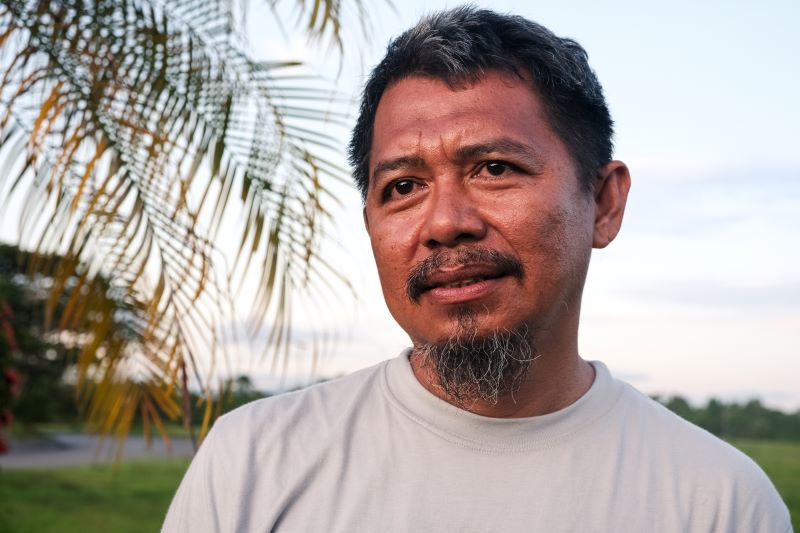Indonesia’s abundant nickel reserves are crucial for a low carbon world. But extracting them is ruining local peoples’ lives and causing rampant deforestation
Perrine Fournier is a trade and forests campaigner at the forests and rights NGO Fern
The view from the highest vantage point in Kabaena island is awe-inspiring. Mountain peaks coated with thin clouds rise over a thick blanket of vegetation.
But the natural beauty of this tropical island in Indonesia’s Southeast Sulawesi province, belies the human and environmental damage that’s unfolding below – and which is set to intensify.
This harm is driven by mining for the vast reserves of nickel which lie beneath the island’s surface. Nickel is defined as a ‘critical mineral’, as it’s an essential component of electric vehicle (EV) batteries. As countries shift away from fossil fuels, global demand for nickel has surged.
Mining companies have been granted access to vast swathes of Kabaena, with licenses awarded to mine around three-quarters of the island’s territory. Only a few mining concessions are currently operating – but their impact is already being felt deeply.
“Because of the mining, all we see is mud. Flooding,” says Sahrul, a local resident. Sahrul is the founder of Sagori, a group resisting mining on the island, and he says that mining has created social conflicts between its supporters and opponents: “Relationships within families are breaking because of the mining.”

Sahrul is a local community activist who founded Sagori to resist mining on Kabaena
Amal, a 25-year-old tourism student, echoes these complaints. He says that while mining has brought economic benefits, it’s also brought environmental ruin. “The mining company broke our forests. They made us lose our river. Water is the main point of life, we get it from nature. But we’re losing it.”
Threatening the Sea Nomads
Reports corroborate these claims.
Indonesia is the world’s biggest nickel producer, and has the largest reserves on earth, most of which are in Sulawesi and Halmahera islands. In the so-called ‘nickel provinces’ of these islands, including Kabaena in Southeast Sulawesi, mining’s damage has manifested itself in different forms.
Last month, Satya Bumi, a local NGO working to protect Indonesia’s forests and ecosystems, published a report comprehensively documenting it.
They detailed the sea and river pollution contaminating once pristine waters, reducing fish stocks, causing children skin infections, and threatening the livelihoods of local people, particularly the Indigenous Bajau community – known as Sea Nomads for their exceptional diving ability.
Indonesia turns traditional Indigenous land into nickel industrial zone
Then there’s deforestation: mining for nickel is now the biggest cause of deforestation in the nickel mining provinces. Out of the 920,000 hectares (ha) of nickel mining concessions in Indonesia, about two-thirds are under forest cover.
So who’s driving this demand and what should be done to mitigate the damage it’s causing?
Energy transition
China, the world leader in producing and exporting EV batteries, has poured investments into Indonesia’s nickel industry since the latter banned raw nickel-ore exports in 2020, to try to boost investments in ‘downstream processing’ (such as refining and battery manufacturing).
In the three years to 2023, Indonesia signed deals worth more than US$15 billion for battery materials with major corporations including Hyundai, LG and Foxconn, Reuters reported last year. So far, however, European investment in Indonesia’s nickel industry has not materialised.
In July, the German chemical manufacturer BASF and the French mining multinational Eramet, pulled out of a huge nickel and cobalt refinery in Indonesia because of its impact on one of the last Indigenous tribes still living in voluntary isolation.
But Satya Bumi’s supply chain mapping of Kabaena’s nickel, provides evidence that it’s entering global supply chains, including to the EU.
What’s more, the EU is currently negotiating a major free trade agreement with Indonesia, and focusing much attention on securing the critical raw materials Europe needs for the green energy and digital transitions – for instance through its Critical Raw Materials Act (CRMA), which entered into force earlier this year.
The EU is therefore keen to strike a deal with Indonesia, believing it will support European investors to secure access to the raw materials that underpin its green investment strategies.
Children’s future
When this happens, EU investment must be built on a partnership with Indonesia which incentivises Indonesia to eliminate the environmental and social damage the industry is wreaking in Kabaena and elsewhere.
Indonesian civil society groups are already working to end this destruction, including by calling for nickel mining No Go Zones to limit forest and biodiversity loss. The Indonesian NGO Auriga Nusantara has reported that forests are disappearing twice as fast in areas surrounding nickel-processing plants than elsewhere.
It’s also essential that Indigenous Peoples and local communities who live in areas coveted by mining companies have their fundamental human right to Free, Prior, and Informed Consent (FPIC) respected.
Tamrin, a 34-year-old coffee shop owner and father of five in Kabaena, has an unequivocal message for those oblivious to the human and environmental cost of their EV batteries: “If you want to buy an electric car, sure. It may be comfortable for you. But consider the places that are impacted by the mineral extraction… I hope to God my children have a future on this Island.”





